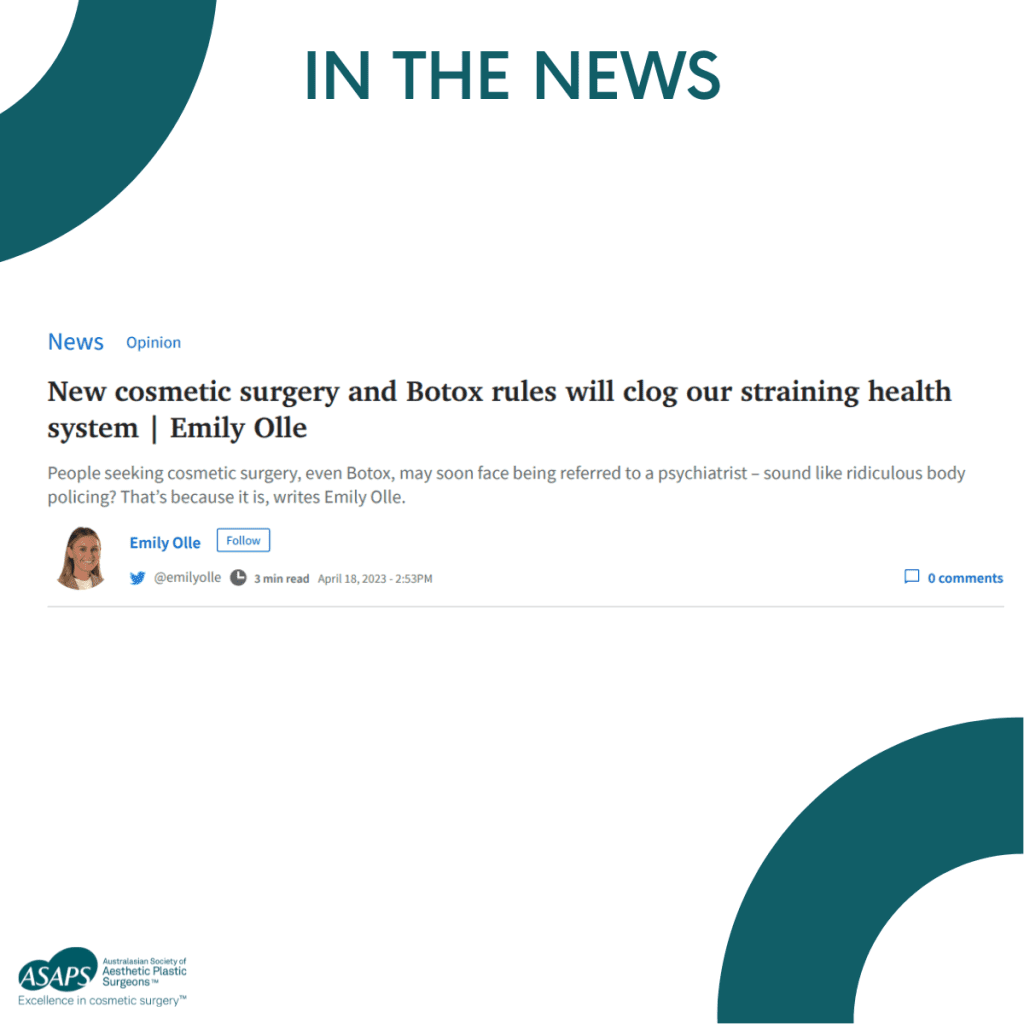People seeking cosmetic surgery, even Botox, may soon face being referred to a psychiatrist – sound like ridiculous body policing? That’s because it is, writes Emily Olle.
“What can I help you with today?” a psychologist asks their new client, finally in their office after a two month wait period.
“I’d like to get rid of my frown lines,” their 35-year-old client replies. “Why’s that?” “Because I don’t like them.” “Do you feel like that’s because of social media pressure?” “Maybe, but I’m pretty sure I’ll feel more confident without them.” “Fair enough. Anything else you’d like to talk about today?” “Not really.”
The pair sits in awkward silence for the next 40 minutes of the session. The psychologist prods around some childhood trauma. The patient says she thinks Kylie Jenner’s lips are too big but was thinking of going for more of an Ariana Grande look. They exchange a mental health plan before tapping the HICAPS machine for a bulk-billed refund and parting ways.
Seem slightly absurd? Under tough new cosmetic procedure rules to be enforced from July 1, people seeking cosmetic surgery such as facelifts, nose jobs, breast work – and even Botox injections – may face being referred to a psychiatrist.
Anyone seeking cosmetic surgery will need a GP referral, while those looking for “cosmetic injectables’ such as Botox face a similar screening test and possibility of being sent to a psychologist or psychiatrist for evaluation.
The Medical Board of Australia announced the move this week, in response to Australia’s increasing uptake of cosmetic procedures.
Deafening social media noise has enforced more unrealistic pressure around people’s appearances than ever, with both men and women, particularly young people, slammed every day with picture-perfect faces, bodies and lives.
Younger patients are turning to plastic surgery to look more like their influencer-filled feeds; and there are real and valid concerns around how mental health issues, such as body dysmorphia, can leave many looking to the multibillion dollar cosmetic industry for answers.
But let’s be clear; this is a policy that’s both likely to further clog our beleaguered health system and disproportionately impacts women.
While there is limited Australian data available, in 2019, the American Society of Plastic Surgeons found women accounted for 93 per cent of plastic surgery procedures in the US and 90 per cent of injectable treatments like Botox.
Medical imposition on, and indifference to, women’s healthcare is a tale as old as birthing stirrups. Almost every woman has a story about battling symptoms or attempting to access treatment, only to be turned away by a disbelieving practitioner.
Women’s health is not taken seriously – until it’s a moral stance.
The Venn diagram of those campaigning against access to abortion or for changes to cosmetic procedure policies, and those advocating for endometriosis research or tangible funding for women’s mental health, is likely two distinct circles.
Of course, many cosmetic procedures are a matter of vanity rather than life-and-death. But that vanity is at the discretion of the person choosing to undertake it, not a GP who decides whether you’re allowed a little jab to smooth some frowny lines.
The argument could be made for required referrals where age is a factor, particularly if 18 to 25-year-olds are seeking anti-wrinkle injections or significant fillers.
But if mental health is the real concern, greater regulation, funding and awareness – not tougher restrictions on minor procedures – is the answer.
Crack down on social media filters and increase disclosure requirements for digital alteration in media publications, or pump funding into in-school campaigns around what real people and bodies look like.
The last thing our burdened mental health system needs is the additional strain of unwarranted referrals all because an older, likely male, GP has passed personal judgment on a cosmetic decision.
Australasian Society of Aesthetic Plastic Surgeons president, Adelaide-based Dr Tim Edwards, said most cosmetic surgeons carefully evaluated patients for mental health issues as well as unrealistic expectations and rejected patients if they were recognised as having psychological issues.
“We are concerned that with GPs under pressure, the last thing they need is fit, healthy people coming in just for a referral for cosmetic surgery,” he said.
Dr Edwards noted the reforms failed to include issues surgeons had lobbied for, such as cosmetic surgery only being done by registered specialists and in accredited facilities.
The concept of better regulating the cosmetic industry amid those pressures is the right one. Any industry, particularly within the health field, has those simply out for a cash grab, particularly when they can prey on the insecurities of vulnerable young people.
But regulation should be exactly that – not just handballing to other already-overloaded practitioners.
-The Advertiser 18th April 2023

